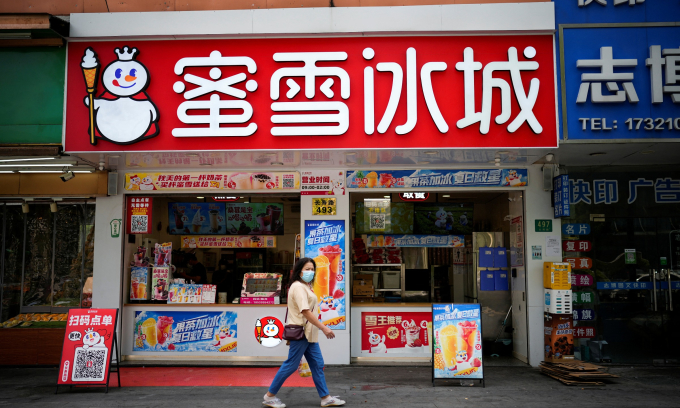How Mixue climbed to top of China’s bubble tea market with $1 drinks
Bubble tea, the drink that has become widely popular in China in recent years, used to be a premium product priced between 25-40 yuan (US$3.4-5.5) seen as a status symbol of modern urban life in China, according to AFP.
But Mixue has been selling milk tea for just under 7 yuan (US$1), ice cream for 2 yuan, and several similarly priced items, and has grown to become China’s top bubble tea brand with over 36,000 stores in the process.
The chain’s affordable prices are a major selling point for many Chinese youth, especially those looking to save money while working in major cities.
The sign of Mixue Bingcheng is seen at its shop in Shanghai, China, Aug. 10, 2023. Photo by Reuters |
The concept behind the brand was hatched by Zhang Hongchao when he was working part-time at a drink kiosk in 1997 while studying at the Henan Economics and Finance College in Zhengzhou, Central China’s Henan province, according to Forbes.
At 21, he borrowed 3,000 yuan from his grandmother to start a shaved ice stall that did not take off.
He shut down that business, but launched a second shaved ice shop, called Mixue Bingcheng, in 1999, this time offering new products such as sugary drinks. The name means “sweet snow palace.”
He later developed an ice cream cone and started selling it for just 1 yuan when similar products sold for 4-5 yuan at the time, according to China Daily.
The product was a hit among Chinese consumers and became one of Mixue’s bestsellers.
Hongchao’s brother, Zhang Hongfu, joined the company in 2007 and established a standardized operational management system that later became the company’s successful franchise model.
Unlike its rivals, which focused on large stores in big cities, Mixue targeted smaller cities with lower income levels, where most of its outlets offer takeout only, as reported by Nikkei Asia.
The firm provides its franchisees with all the necessary items, including kitchen appliances and ingredients, while charging a low franchise fee, which accounts for just 2% of its revenue.
Some 99.8% of its over 36,000 stores are run by 16,000 franchisees, making it one of the biggest franchise operators globally.
Innovation plays a crucial role in Mixue’s rise to the top. While developing and promoting its franchise model, Hongfu also made key optimizations to the firm’s operations to help improve quality and lower costs.
Mixue introduced a centralized factory system in 2012 and has since set up several facilities producing raw materials with an annual comprehensive capacity of around 1.43 million tons as of the end of September.
It produces up to 60% of the ingredients supplied to franchises and 100% of its core ingredients, according to a report by China Insights Consultancy.
It also created its own logistics system in 2014, providing nationwide free delivery to franchisees, a novel approach in the made-to-order beverage industry.
Mixue’s mascot, “Snow King,” has also gained popularity across various regions. Global social media discussions about Mixue’s theme songs and mascot had accumulated over 8.7 billion and 8.4 billion views, respectively, by the end of last year, as reported by Xinhua News Agency.
 |
Mixue drinks on a table, with a statue of the mascot, Snow King, in the background. Photo from Mixue Vietnam’s Instagram |
Building on its success on home turf, Mixue began its international expansion in 2018, opening its first overseas store in Vietnam’s capital city of Hanoi. By mid-April last year, it had launched its 1,000th store in the country.
It now operates approximately 4,000 outlets across 11 countries, including Vietnam, Thailand, Japan, South Korea, and Australia.
This makes it the leading made-to-order tea beverage brand in Southeast Asia and, according to Singapore-based research firm Momentum Works, the fourth largest food and beverage brand worldwide.
However, the bubble tea sector in China has been heating up with fierce competition and several popular Chinese bubble tea brands have either seen their stocks plunge or had rocky initial public offerings (IPO) this year.
One such brand is teamaker Sichuan Baicha Baidao, also known as Chabaidao, which experienced a 27% decline in its shares on its April trading debut, followed by another 9.4% drop the next day. Though the downturn has moderated, its shares remain 38% lower since the listing.
Evelyne Chang, market analyst at market research firm China Skinny, said many restaurants and cafes in China are cutting their prices to match consumer spending behavior, leading to a price war in the industry.
Nonetheless, Mixue “has the first-mover advantage in the low-price milk tea segment,” she added.
While Mixue is one of the few brands that still see growth amid the slump, its IPO application, along with that of Guming – another major bubble tea chain in China, was put on hold by the China Securities Regulatory Commission, Reuters reported in September.
Its founders, the Zhang brothers, saw their individual net worths, which were $1.2 billion in January, drop to $980 million by April, according to Forbes.
But things might be looking up for bubble tea chains as the securities regulator has recently approved a Hong Kong IPO by Guming, Bloomberg reported on Tuesday.
Christine Xu, a partner at law firm Linklaters LLP, commented: “No one has the crystal ball for the regulatory approval process, but it seems to be a positive sign for the bubble-tea chain stores.”


Comments are closed.